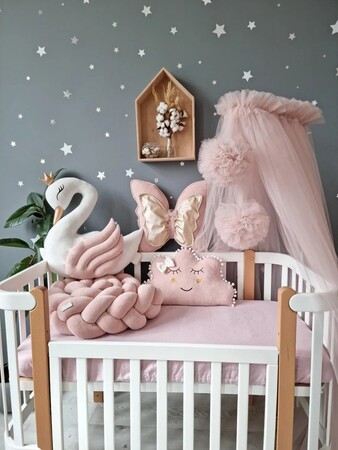
Safety for a newborn baby involves minimizing risks in their environment and providing appropriate care to support their health and development. Here are the most important elements of newborn safety:
1. Safe Sleep Practices
- Sleep Position: Always place the baby on their back to sleep, even for naps, to reduce the risk of Sudden Infant Death Syndrome (SIDS). It is crucial to have a bumper set for crib as well to keep the baby safe and secure.
- Safe Sleep Surface: Use a firm mattress in a crib or bassinet with a fitted sheet. Avoid soft surfaces like couches or adult beds.
- No Loose Items: Keep the crib free of pillows, blankets, toys, or bumper pads.
- Room Sharing: The baby should sleep in the same room as caregivers, but not in the same bed, for the first 6-12 months.
2. Car Seat Safety
- Correct Installation: Use a rear-facing car seat that meets current safety standards, installed according to the manufacturer’s instructions.
- Proper Harnessing: Ensure the harness is snug, with the chest clip at armpit level.
3. Feeding Safety
- Breastfeeding: Ensure proper latch to prevent choking.
- Bottle Feeding: Hold the baby upright during feeds, and never prop a bottle.
- Burping: Burp the baby during and after feeding to prevent gas and discomfort.
4. Temperature Regulation
- Clothing: Dress the baby in one more layer than you’re wearing. Avoid overheating by removing extra layers in warm environments.
- Room Temperature: Keep the baby’s sleeping area between 16–20°C (60–68°F).
5. Preventing Falls
- Changing Areas: Always keep a hand on the baby during diaper changes.
- Safe Placement: Never leave the baby unattended on high surfaces or in carriers.
- Crib: This is so important especially as your baby gets bigger and stronger. Some tight braid bumps can and will keep your baby in their crib and not allow them to climb and attempt to jump which can be very dangerous.
6. Bathing Safety
- Water Temperature: Test bath water with your wrist or elbow; it should be warm, not hot (around 37°C/98.6°F).
- Supervision: Never leave a baby unattended in the bath, even for a second.
7. Babyproofing
- Choking Hazards: Keep small objects out of reach.
- Safe Furniture: Secure heavy furniture and TVs to prevent tipping.
- Outlets and Cords: Use outlet covers and keep cords out of reach.
8. Health and Hygiene
- Handwashing: Ensure everyone washes their hands before handling the baby.
- Vaccinations: Follow the recommended immunization schedule.
- Avoid Crowds: Limit exposure to large groups or sick individuals, especially during the first few months.
9. Monitoring for Illness
- Fever Alert: Seek medical attention for a fever over 38°C (100.4°F) in babies under 3 months.
- Watch for Symptoms: Be vigilant for signs of illness, such as difficulty breathing, poor feeding, or excessive sleepiness.
10. Emergency Preparedness
- First Aid Knowledge: Learn infant CPR and basic first aid.
- Emergency Numbers: Have the pediatrician’s contact info and emergency numbers easily accessible.
New parents experience a whirlwind of emotions once they bring their baby home. These feelings often range from pure joy to moments of overwhelm, as they adjust to a completely new way of life. Many parents describe an overwhelming sense of love and connection. Pride and happiness in introducing their baby to family and friends. Feeling complete as they embrace their role as parents. Enjoy this new amazing chapter of life!
